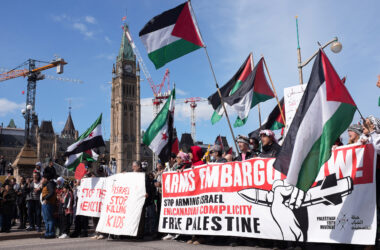On March 27, Dean of Arts Christopher Manfredi held the third of four open fora at Macdonald Campus. In addition to a group of about 30 attendees, most of whom were faculty members and staff, Provost Anthony Masi and Deputy-Provost (Student Life and Learning) Morton Mendelson were also present.
The Open Forum project was mandated by Principal Heather Munroe-Blum following Dean of Law Daniel Jutras’ report on the events of Nov. 10. In his report, Jutras recommended the creation of activities that would allow the McGill community to debate “the meaning and scope of the rights of free expression and peaceful assembly on campus,” as well as issues like the securitization of the university.
“I know in a bucolic atmosphere like Mac campus these may seem like downtown issues-protests, picketing and various activities like that,” Manfredi said as he opened the discussion. “But it seems to me that it’s important to get the views of the entire university community, which includes Mac campus. And Mac campus may in fact have its own issues around these lines that we’re not aware of.”
Manfredi asked whether there were any areas in Macdonald campus that are particularly vulnerable and should perhaps be out of bounds for protesting. A professor who could not be identified noted that the greenhouses should be out of bounds, as sensitive research going on there, on issues like genetic engineering, might be compromised by disruptions or alterations of the space.
Some professors noted that the tone of McGill MRO’s have not been conducive to dialogue.
“As a professor you felt caught in the middle between the colleagues that we felt very close to and the university’s position,” Tim Johnson, professor of dietetics and nutrition, said. “And the messages we got via email set a tone that certainly made me feel like I better not speak out on an issue like this. This dampens our enthusiasm to express ourselves on a number of issues.”
Manfredi brought up the securitization of campus and alluded to the security issues of Macdonald campus, including recent attacks on homosexual students. Professor Carolyn Begg expressed concerns that the community was notified of the attacks seven hours after they occurred, noting that community members often worked late at night.
“[The issue is] security on the campus-it’s almost the opposite problem [as in the downtown campus],” she said. “There’s a lot of access, and it’s about my personal security, not from students, but from outside people.”
George McCourt, a professor with the McGill school of environment, suggested that the intimate environment provided by Macdonald campus means that students view their relationship to the university community differently than students at the downtown campus.
“I think there’s more of a [sense of] community out here, [whereas] the students downtown see themselves as anonymous,” he said. “When you’re anonymous [or] you’re having a conversation with someone who’s anonymous, I think your reaction is quite different than out here when you’re having a conversation with a student.”
According to McCourt, this sense of anonymity could lead some students, such as the Nov. 10 occupiers of the James Administration Building, to use more radical tactics to have their voices heard. Manfredi then asked the audience what could be done to lessen the sense of anonymity at the downtown campus.
Begg said that one of the reasons Macdonald campus has such a strong sense of community is because professors engage with students on levels outside of the lecture hall-for example, by becoming involved with student groups.
Gary Pekeles, director of the McGill University Health Centre’s Northern and Native Child Health Program, suggested that part of the reason Macdonald campus has a strong sense of community is because their small size and population makes the campus much more manageable than the downtown campus.
“[At the downtown campus] there is variability within day-to-day encounters and the intimacy of those encounters, but somehow, within the dynamics of the large strike in particular, there is a dampening of that effect that doesn’t exist here [at Macdonald campus] because of our isolation,” he said.
Much of the forum focused on the terminology associated with the university community. According to Associate Vice-Principal Jim Nicell, one of the main problems facing McGill is how the university sees its own role in the community.
“We’ve evolved to be more and more of a rule-based organization, and there’s a sense that we need to get the rules right so we can get everybody organized, and then all we have to do is behave by the rules,” he said. “But once we get a set of rules, life becomes black and white, and I don’t think the issues we’re talking about are really black and white.”







